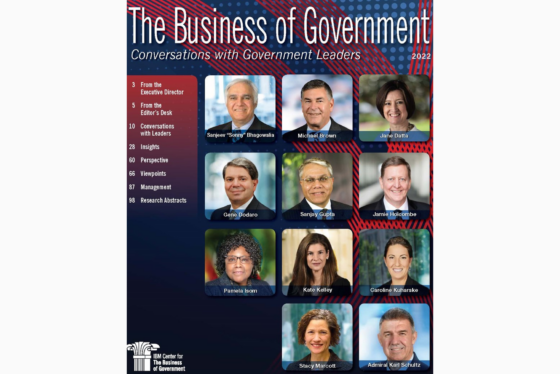How to make good ideas great and great ideas scale: A conversation with John List
What is the Voltage Effect? Why do some ideas fail while others change the world? What are the five hurdles one must clear to ensure the vitality of an idea? Why should policymakers move from evidence-based policy to policy-based evidence? Join host Michael Keegan as he explores these questions and more with Professor John List, author of The Voltage Effect and Economist at the University of Chicago.
Tune in to the show Mondays at 11 a.m. and Fridays at 1 p.m. on Federal News Network.
Featured speakers
-

John A. List
Kenneth C. Griffin Distinguished Service Professor in Economics, University of Chicago
-

Michael J. Keegan
Leadership Fellow & Host, IBM Center for The Business of Government
From the Editor's Desk
Latest Magazine

John A. List
Kenneth C. Griffin Distinguished Service Professor in Economics, University of Chicago
John A. List is the Kenneth C. Griffin Distinguished Service Professor in Economics at the University of Chicago. He received his B.S. in economics at the University of Wisconsin-Stevens Point and Ph.D. in economics at the University of Wyoming. List joined the UChicago faculty in 2005, and served as Chairman of the Department of Economics from 2012-2018. Prior to joining the University of Chicago, he was a professor at the University of Central Florida, University of Arizona, and University of Maryland.
List was elected a Member of the American Academy of Arts and Sciences in 2011 and a Fellow of the Econometric Society in 2015. He is currently the Visiting Robert F. Hartsook Chair in Fundraising at the Indiana University Lilly Family School of Philanthropy. He received the Arrow Prize for Senior Economists in 2008, the Kenneth Galbraith Award in 2010, the Yrjo Jahnsson Lecture Prize in 2012, the Klein Lecture Prize in 2016, and the Hartsook Growing Philanthropy Award in 2017. He received an honorary doctorate from Tilburg University in 2014 and from the University of Ottawa in 2017. John was also named a Top 50 Innovator in the Non-Profit Times for 2015 and 2016 for his work on charitable giving. He served in the White House on the Council of Economic Advisers from 2002-2003 and is a Research Associate at the NBER, a Research Fellow at the Institute for the Study of Labor (IZA), a University Fellow at Resources for the Future (RFF), and a University Fellow at Tilburg University in the Netherlands.
His research focuses on questions in microeconomics, with a particular emphasis on using field experiments to address both positive and normative issues. For decades his field experimental research has focused on issues related to the inner-workings of markets, the effects of various incentives schemes on market equilibria and allocations, how behavioral economics can augment the standard economic model, on early childhood education and interventions, and most recently on the gender earnings gap in the gig economy (using evidence from rideshare drivers).
His research includes over 200 peer-reviewed journal articles and several published books, including the 2013 international best-seller, The Why Axis: Hidden Motives and the Undiscovered Economics of Everyday Life (with Uri Gneezy).

Michael J. Keegan
Leadership Fellow & Host, IBM Center for The Business of Government
Michael has two decades of experience with both the private and public sectors encompassing strategic planning, business process redesign, strategic communications and marketing, performance management, change management, executive and team coaching, and risk-financing.
Michael leads the IBM Center for The Business of Government's leadership research. As the Center’s Leadership Fellow, his work is at the nexus of the Center’s mission – connecting research to practice. My work at that the Center complements frontline experience of actual government executives with practical insights from thought leaders who produce Center reports – merging real-world experience with practical scholarship. The purpose is not to offer definitive solutions to the many management challenges facing executives, but to provide a resource from which to draw practical, actionable recommendations on how best to confront such issues. Michael also hosts and produces the IBM Center’s The Business of Government Hour. He has interviewed and profiled hundreds of senior government executives from all levels of government as well as recognized thought leaders focusing on a range of public management issues and trends. Over the last four years, Michael has expanded both the show’s format and reach – now broadcasting informational and educational conversations with dedicated public servants on two radio stations five times a week and anywhere at anytime over the web and at iTunes. Michael is also the managing editor of The Business of Government magazine, with a targeted audience of close to 14,000 government and non-government professionals. Additionally, he manages the Center’s bi-annual proposal review process that awards stipends to independent, third party researchers tackling a wide range of public management issues.
Prior to joining the Center, Michael worked as a senior managing consultant with IBM GBS (Global Business Services) and as a principle consultant with PriceWaterhouseCoopers’ Washington Consulting Practice (WCP). He led projects in the private and federal civilian sectors including the U.S. Department of Energy, U.S. Department of Homeland Security, Centers for Medicare and Medicaid Services, FEMA, and the Veterans Health Administration. Before entering consulting, he worked in the private sector as product development manager at a New York City based risk financing firm.
Since 2003, Mr. Keegan has been a reviewer for Association of Government Accountant’s Certificate of Excellence in Accountability Reporting (CEAR)© program, keeping abreast of the most recent developments in authoritative standards affecting federal accounting, financial reporting and performance measurement. He is also a member of APPAM, the NYU Alumni Association, and the Data Center & Cloud Talent, USA. He holds masters in public administration and management from New York University and was the founder of its DC alumni group as well as previous treasurer of the NYU graduate school’s alumni board.

